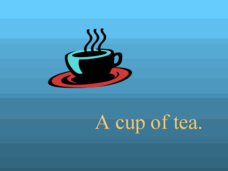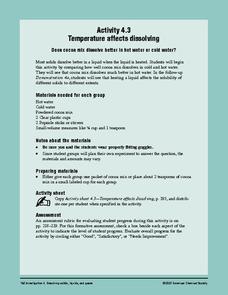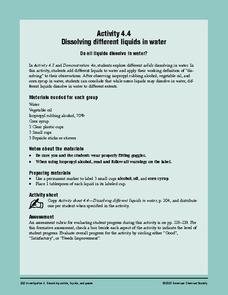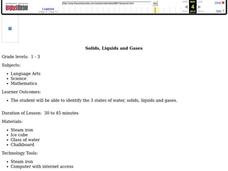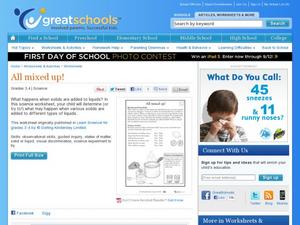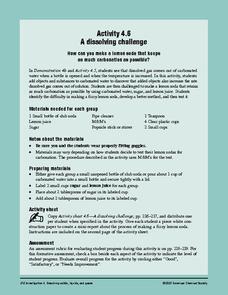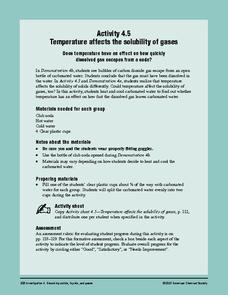American Chemical Society
Defining Dissolving
Physical science investigators mix sugar and food coloring into different cups of water and cooking oil to compare how the solid and liquid behave in each. As the introduction to this unit on dissolving, it is relevant.
Curated OER
Sugar in Tea
Little chemists address whether or not you can get sugar back out of tea after it has dissolved. The PowerPoint itself simply walks them through the questioning process, considering different possibilities. The final slide settles on...
American Chemical Society
Temperature Affects Dissolving
Stir chocolate drink mix into hot and cold water to see if there is a difference in how quickly it dissolves. Number three in a six-instructional activity unit on dissolving, this installment investigates the effect of temperature. If...
American Chemical Society
Dissolving is a Property
Believe it or not, it is possible for liquids and solids to get along! A hands-on lesson has individuals explore dissolving properties of candies in water. They complete an activity guide to record observations about different candies...
American Chemical Society
Dissolving and Back Again
From solid to liquid and then back again. Young scientists dissolve salt in water and then evaporate the water while observing what happens to the solute. They use their observations to make predictions about other solutions.
American Chemical Society
Dissolving a Substance in Different Liquids
Second of six lessons in a unit on dissolving, this one focuses on how sugar behaves in different liquids. Learners stir it into water, alcohol, and oil and make observations. This lesson can stand alone, but is best used as part of the...
American Chemical Society
Can Gases Dissolve in Water?
Why does soda fizz when opened? Learners discuss the appearance of bubbles in soda bottles when opened. In groups, they design and complete an experiment comparing the amount of carbon dioxide dissolving in cold versus hot liquids.
Aquarium of the Pacific
States of Matter: Making Ice Cream
Who knew that learning about the states of matter could taste so sweet? This fun hands-on lesson captures the attention of learners as they use what they know about solids, liquids, and gases to create their very own batch of ice cream.
American Chemical Society
Why Does Water Dissolve Sugar?
Did you know that if you wait long enough, the M on the outside of an M and M will float to the surface when submerged in water? Learners observe the sugar coating of an M and M while it is dissolving in water. They explain how this...
American Chemical Society
Dissolving Different Liquids in Water
Not many youngsters realize that solids aren't the only materials that can possibly be dissolved in water. During this investigation, they find out that some liquids can dissolve in water as well. This is part of a unit on solubility,...
Curated OER
Solids, Liquids and Gases
Students explore solids, liquids, and gases. In this states of water lesson, students conduct a scientific investigation that requires them to observe and note the differences among solid, liquids, and gases.
Curated OER
All Mixed Up!
What happens when solids are added to liquids? After reading an informative paragraph about solutions, learners answer six true/false questions regarding solutions, and what substances will dissolve into liquids they are mixed with. A...
Curated OER
Mixtures of Matter
Young scholars experiment with solids and liquids. In this mixtures of matter lesson, students combine matter to form solutions. Young scholars hypothesize, test, and analyze the data to draw conclusions. The lesson can be extended by...
Curated OER
Reversible and irreversible changes
Students experiment with solids and liquids to find which solids will dissolve in water. This dissolution and mixtures lesson can be completed online or in class as all materials are connected to the lesson plan for both settings.
Curated OER
"I'm Melting!"
Third and fourth graders engage with a activity designed to help them differentiate between melting and dissolving. After reading an informative paragraph about the two actions, they consider four scenarios, and choose whether they...
American Chemical Society
A Dissolving Challenge
After collecting carbon dioxide bubbles from a cup of club soda, learners attempt to make their own lemon soda while preventing the loss of carbonation. They do so by creating a syrup before mixing the substances into the club soda....
Curated OER
Solids and Water
Students investigate mixtures made of water and familiar solid materials. They observe and discuss the changes that occur immediately and set the mixtures aside for a day. Finally, students observe the mixtures, note changes, and graph...
Curated OER
Chalk Chromatography
Your chemistry class is sure to love this experiment on column chromatography, as demonstrated with chalk sticks and felt tip markers. Pupils use sidewalk chalk (another inexpensive form of chalk stick) to demonstrate adsorption and the...
Curated OER
Solutions and Suspensions
Learners explore matter by conducting an in class demonstration. In this liquid mixture lesson, students identify the difference between a solution in which a solid dissolves into liquid, and a suspension where the solid doesn't dissolve...
American Chemical Society
Temperature Affects the Solubility of Gases
Dare your class to drive dissolved carbon dioxide out of carbonated liquid at different temperatures to discover if there is a difference in rate. To make this experiment more sound, have explorers use equally measured amounts of soda...
Curated OER
The Effect of Temperature on Solubility
In this solubility worksheet, students conduct an experiment to see how temperature effects the solubility of salt in water. Students record their data in a chart and then graph the results. Then students complete 2 short answer questions.
Curated OER
The Nature Of Dissolving Processes
Young scholars examine the rule of "like dissolves like." They define and describe solutions and solubility models on molecular liquids, ionic solids, and molecular solids.
Royal Society of Chemistry
Organic Molecules Day—Chemistry Outreach
In search of an organic lab that employs real-life techniques and analysis methods? Groups carry out the nitration of methyl benzoate, then attempt to determine the number and location of the nitro groups added to the benzene ring....
Curated OER
States of Matter Summary
In this states of matter worksheet, students are given a summary of the particle arrangement, the motion of particles, the properties of particles and models of particles in solids, liquids, and gases. Melting, evaporating and boiling,...



